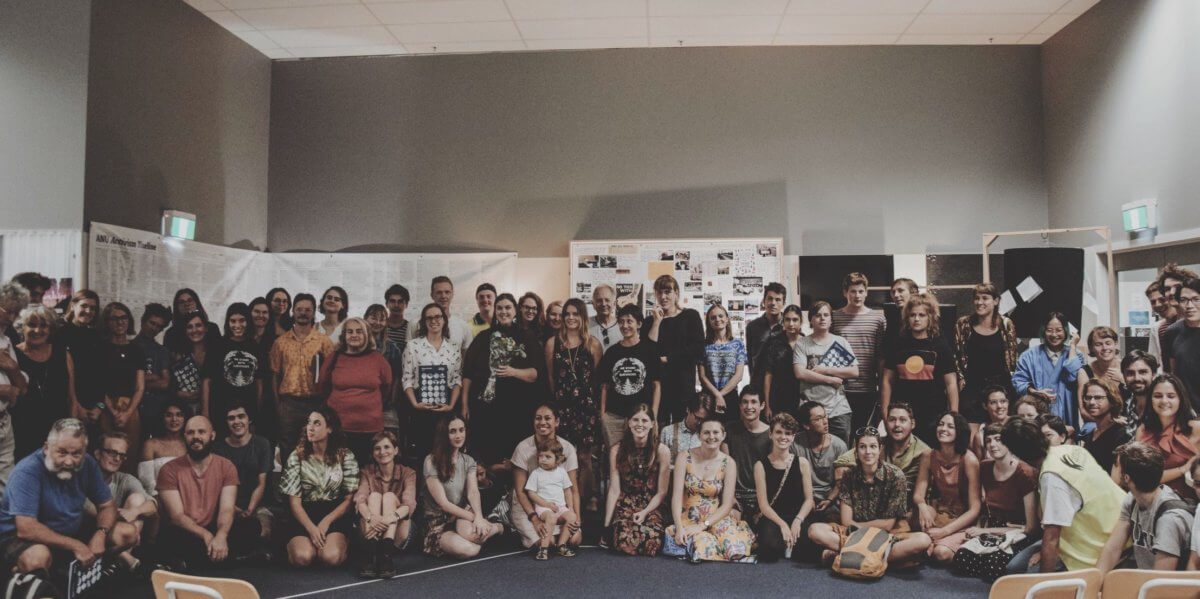Last Valentine’s Day, the student-led journal Demos held an evening gathering to celebrate the launch of the journal’s first printed edition. For those unfamiliar with Demos, it’s a relatively young but fast-growing student media outlet that is importantly different to Woroni and ANU Observer. Modelled partly around real academic and creative journals, and with frequent editorial and written contributions from academics themselves, the quality and rigor of articles is unparalleled in student publications.
The night’s event was focused on the topic of student activism, a recurrent theme in the journal, and one its inaugural print edition focused on exclusively. Pre-event setup involved the hanging of an enormous banner representing a timeline of student activism at ANU from 1960 to the present day, charting a dizzying range of student protests, rallies, and publicity stunts. Some events were sobering historical reminders, like the Vietnam war protests. Others served to remind us of how elusive victory has been on some fronts, such as Invasion Day protests going back to the 70’s. Yet others provided some levity, such as the August 16th entry wherein “Bill Shorten was heckled”.
In addition to an art installation – which I sadly wasn’t able to check out – the event included a range of inspiring speeches from current and former staff and students. For a moment, the past, present and future of student activism coalesced into a single space, as people from across eras shared their experiences. Memorable was Judy Turner, a former student activist at ANU, human rights advocate, and fundraiser.
Turner spoke of student activism with a great sense of humour, recounting how in her day – the psychedelic 70’s – student activists smoked pot “almost as a point of principle”. She described her movement as one fuelled by brown rice and tuna, a miasma of dope, and riddled with STDs! “What did we want?” she asked of their protests, “pretty much everything!”. And with the patience of the Baby Boomer generation, the answer to “When do we want it?” was always a resounding “Now!” Turner closed with the wry reflection that the answer to “What do we want” for her generation is now more likely to be “A new hip!”
Not speaking at the event, but present to support it, was Mia Sandgren, an ANU tutor in sustainability, a Demos editor, and a contributor to the latest edition. Sandgren’s article ‘Redefining Normality with Acts of Everyday Activism’ is recommended reading. In it, she argues that students make ideal ‘everyday activists’ with small and ordinary acts like riding a bike to campus. Such actions help normalize more sustainable ways of living. I single her article out because the underlying message is an important one: criticism and destruction is easy, doing and creating are the harder tasks by far – and yet, some tasks are small in their commitment required, and large in their collective impact. There’s cause for hope and optimism in realizing such simple truths.
Another memorable speaker was Katerina Teaiwa, an ANU academic and activist. Raised in Fiji, Teaiwa has worked and studied around the world at Santa Clara in Silicon Valley, in Hawaii, and more recently here at ANU. Teaiwa’s experience of activism within these different regional contexts was especially illuminating. Her view on writing for the Santa Clara media echoes my own beliefs – in it she saw an opportunity to share knowledge, and to reveal a part of her world and her experiences that people had no idea about. This very article appears for the same reasons – for a moment that evening I was part of something, and I want to do what I can to share it.
Equally interesting was her recollection of a protest she attended here, at ANU. A colleague questioned this, asking if she thought her participation as a staff member was appropriate. That moment struck Teaiwa because it reflected an unfamiliar dynamic. In Hawaii, she recalled, the idea of students and staff coming together as activists was a common one – indeed, it was a collaboration seen as necessary for greater success.
Here in Australia, however, we don’t embrace this sense of staff-student collaboration anywhere near as much. That’s a point of sadness, to be sure, but also represents a clear opportunity. What gains might student activism at ANU make if we collaborated more closely with our tutors, our lecturers, and other academics? As a joint project uniting staff and students, Demos itself is a great example of the fruits of such collaboration. Elsewhere on campus we can see similar benefits. The involvement of staff like John Minns and McComas Taylor in the Refugee Action Committee gives that student outfit considerable wisdom, expertise and organisational acumen.
Although the event had so many important take-home messages, and the journal itself even more valuable lessons, perhaps this is the best point to finish on. If you’re involved in a student organisation, whether as member or executive, you might consider the role you can help play bringing students and staff together. If you are a staff member, you might also consider what value you could bring to student’s lives and campaigns on campus. The benefits of “imagining ourselves as one community” – as Teaiwa put it – are profound, and there’s much work we at ANU can do in this space.
Copies of both Demos journal’s first print edition, and the ANU’s Activism Timeline are available at the Brian Kenyon Student Space (BKSS).
We acknowledge the Ngunnawal and Ngambri people, who are the Traditional Custodians of the land on which Woroni, Woroni Radio and Woroni TV are created, edited, published, printed and distributed. We pay our respects to Elders past and present. We acknowledge that the name Woroni was taken from the Wadi Wadi Nation without permission, and we are striving to do better for future reconciliation.
